Presenter: Parables https://www.youtube.com/watch?v=-4ia-vrVXl8 Click for audio file
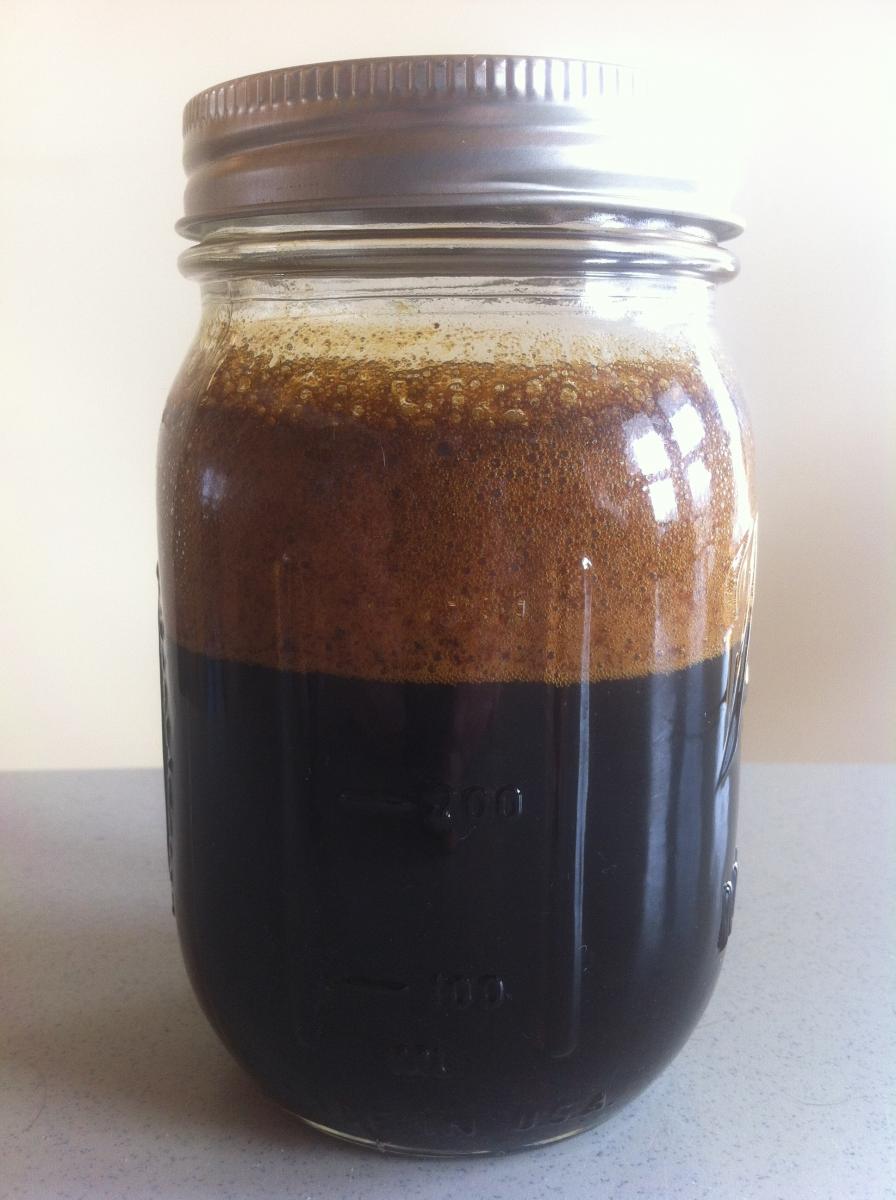
News
Question: “Do Farmers Work in Winter?” Answer: Yes
Jan 01 2015
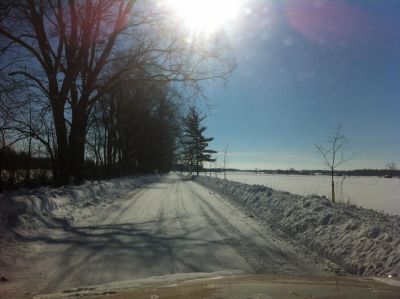 Cold temperatures and relative quiet made for a calm month on the farm here at Merry Lea. Though not always fun, January gives Dale and me time to wash vegetable trays and buckets, put away supplies still lingering out of place in various storage rooms, trap mice that want to chew on bags of compost inoculant or peat moss, and continue reviewing records and documents from the past year. The big to-do takes weeks to accomplish, but was done as planned by the end of the month: ordering seed for the coming season! I’m so glad it’s done, as juggling which company has what, ensuring that we are covering our planned spaces adequately, and carefully reading labels to see which seed is certified organic is quite a chore. The task forced me to continue the job in Goshen, detailing the final order until about 9 pm on a Friday night, but at least I know the seed is in the mail. Waiting any longer, and many of the varieties we want would no longer be available.
Cold temperatures and relative quiet made for a calm month on the farm here at Merry Lea. Though not always fun, January gives Dale and me time to wash vegetable trays and buckets, put away supplies still lingering out of place in various storage rooms, trap mice that want to chew on bags of compost inoculant or peat moss, and continue reviewing records and documents from the past year. The big to-do takes weeks to accomplish, but was done as planned by the end of the month: ordering seed for the coming season! I’m so glad it’s done, as juggling which company has what, ensuring that we are covering our planned spaces adequately, and carefully reading labels to see which seed is certified organic is quite a chore. The task forced me to continue the job in Goshen, detailing the final order until about 9 pm on a Friday night, but at least I know the seed is in the mail. Waiting any longer, and many of the varieties we want would no longer be available.
What resources do we use in planning our beds and our seeds? I’m glad you asked. I’m inclined to keep the following books handy while scanning web pages (Johnny’s Selected Seeds, Baker Creek Heirloom Seed Co., Seed Savers Exchange, etc): Square Foot Gardening (Mel Bartholomew), How to Grow More Vegetables (John Jeavons), and of course The New Organic Grower (Eliot Coleman) along with a few webpages that remind me how long certain seed types remain viable.
Seed ordering can be a royal pain. It’s maddening to have three years of field maps sprawled out in front of me, planning crop rotations to prevent additional insect and disease pressure (as well as thinking about soil fertility), inventorying seed, thinking about which crops will go to which market, greenhouse bench space for germinating, the timing of it all, calculating planting densities within beds, etc. All of this goes into determining the seed order. And yet, doing so brings a flush of energy as I thumb through the gorgeous photographs of things like heirloom okra and remind myself that someday it will be warm enough for t-shirts and picking jalapenos outdoors. By late winter, we are beginning to feel the energy returning for starting a new season, though slow days with deep snow help keep us grounded that there is still time to take it slower, recooperate a bit.
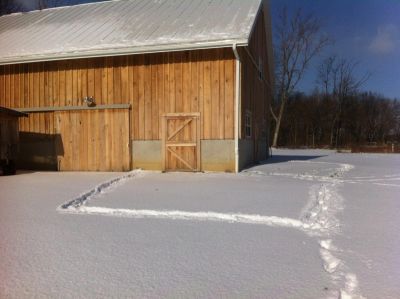 It’s now official: we’ve settled on pigs as the next species we add to Merry Lea Sustainable Farm. With the help of a high school senior who job shadowed myself and other Merry Lea staff, proposed outdoor pens for the pigs and chickens were demarkated over a fresh bed of snow earlier in the month. I can picture it now, hearing the grunts and oinks as July mulberries fall over the fence for some hungry hogs. Agroecology students this summer are going to love it. And so will our compost bins!
It’s now official: we’ve settled on pigs as the next species we add to Merry Lea Sustainable Farm. With the help of a high school senior who job shadowed myself and other Merry Lea staff, proposed outdoor pens for the pigs and chickens were demarkated over a fresh bed of snow earlier in the month. I can picture it now, hearing the grunts and oinks as July mulberries fall over the fence for some hungry hogs. Agroecology students this summer are going to love it. And so will our compost bins!
January also involves lots of mini indoor projects, like worm composting. We recently acquired the vermicompost bin that was being cared for by another program area at Merry Lea. This perforated blue bin is housing red worms that are eating our orange peels, kohlrabi skins, carrot tops, and apple cores, turning the medium into a black, rich material that will boost our soil fertility, probably in the greenhouse this coming season. A layer of damp newspaper shreds over top, and the worms seem to be just fine, writhing in the dark. I’m glad someone’s feeling so active this winter.
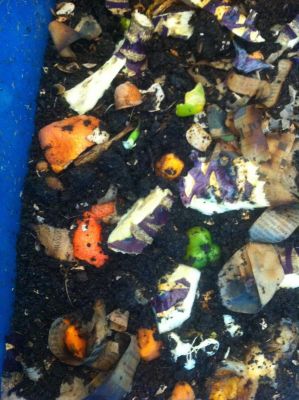 Meetings, meetings, and more meetings. That’s winter for ya. January is a time to look ahead at many areas of Merry Lea, not just agroecology and the farm. We had a team meeting this month at our director’s home one snowy morning, a day of prioritizing Merry Lea projects in small groups, talking about self-care, and reflecting on each of our own personal childhood experiences outdoors, and how our childhood tendencies have colored our work here as adults. This was an enjoyable meeting. But then there are other meetings with more tedious details — meetings of who-does-what, reviewing records and expenses, and staff planning. Are there new topics to cover during ASI this summer that we didn’t get to last summer? The answer is yes! This triggers a hunt for appropriate text books, articles, short films, and activities that cover the material. The time to compile these resources is now. Soon the greenhouse will be keeping Dale and me busy, too busy for meetings and scanning the library.
Meetings, meetings, and more meetings. That’s winter for ya. January is a time to look ahead at many areas of Merry Lea, not just agroecology and the farm. We had a team meeting this month at our director’s home one snowy morning, a day of prioritizing Merry Lea projects in small groups, talking about self-care, and reflecting on each of our own personal childhood experiences outdoors, and how our childhood tendencies have colored our work here as adults. This was an enjoyable meeting. But then there are other meetings with more tedious details — meetings of who-does-what, reviewing records and expenses, and staff planning. Are there new topics to cover during ASI this summer that we didn’t get to last summer? The answer is yes! This triggers a hunt for appropriate text books, articles, short films, and activities that cover the material. The time to compile these resources is now. Soon the greenhouse will be keeping Dale and me busy, too busy for meetings and scanning the library.
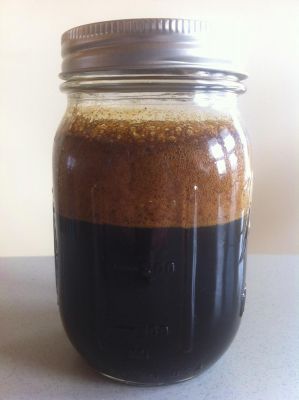 By the end of the month, new energy seems to be rising. Staff are around, everyone having returned from New Years travel. The days are getting longer, and one can feel the sun rising higher, especially when stepping into the greenhouse. The Women’s Spiritual Retreat gets me active again, as the menu that Merry Lea staff plans typically entails ingredients from our farm. This year, we were able to keep some winter greens alive, and had our usual stock of potatoes, homemade grape juice, molasses, and frozen tomatoes and squash that Janie was able to use in her soup and snacks. I’m sure the women enjoyed the local ingredients (food miles: 0.25 mile to the barn kitchen).
By the end of the month, new energy seems to be rising. Staff are around, everyone having returned from New Years travel. The days are getting longer, and one can feel the sun rising higher, especially when stepping into the greenhouse. The Women’s Spiritual Retreat gets me active again, as the menu that Merry Lea staff plans typically entails ingredients from our farm. This year, we were able to keep some winter greens alive, and had our usual stock of potatoes, homemade grape juice, molasses, and frozen tomatoes and squash that Janie was able to use in her soup and snacks. I’m sure the women enjoyed the local ingredients (food miles: 0.25 mile to the barn kitchen).
Towards the end of the month, I made a visit to central Illinois for a farmer gathering arranged by Savannah Institute who helps us with our ‘Woody Perennial Polyculture’ research. Giving a five-minute presentation update about Merry Lea Sustainable Farm and our agroeocology program is a treat, and many are impressed that Goshen Colleg is offering leadership in innovative areas of agriculture and sustainability. Even more of a treat: spending hours talking with other farmers who are trying out this new approach to agriculture (planting mixed rows of woody fruit and nut-producing plants)! I certainly came away with new ideas from partners in Illinois, Wisconsin, Ohio, and Kentucky who joined us in the food coop there in Urbana, IL. I look forward to the growing connections between collaborating farms and colleges (including Berea College).
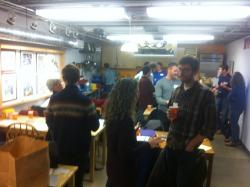 Bring on February! With the new month will come student recruiting, seed starting (onions and brassicas), and the MOSES conference in LaCrosse! Hopefull broomball lunch breaks will continue to be possible, weather permitting.
Bring on February! With the new month will come student recruiting, seed starting (onions and brassicas), and the MOSES conference in LaCrosse! Hopefull broomball lunch breaks will continue to be possible, weather permitting.
Blessings, and thank you for reading about our efforts here at Merry Lea Sustainable Farm.
– Jon Zirkle, Farm Manager & Agroecology Instructor